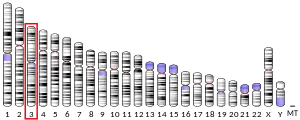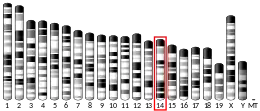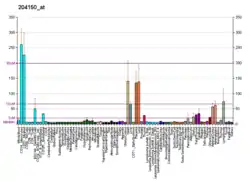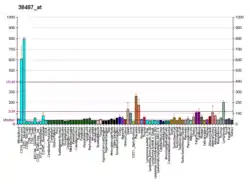STAB1
Stabilin-1 is a protein that in humans is encoded by the STAB1 gene.[5][6][7]
| STAB1 | |||||||||||||||||||||||||||||||||||||||||||||||||||
|---|---|---|---|---|---|---|---|---|---|---|---|---|---|---|---|---|---|---|---|---|---|---|---|---|---|---|---|---|---|---|---|---|---|---|---|---|---|---|---|---|---|---|---|---|---|---|---|---|---|---|---|
| Identifiers | |||||||||||||||||||||||||||||||||||||||||||||||||||
| Aliases | STAB1, CLEVER-1, FEEL-1, FELE-1, FEX1, STAB-1, SCARH2, stabilin 1, FEEL1 | ||||||||||||||||||||||||||||||||||||||||||||||||||
| External IDs | OMIM: 608560 MGI: 2178742 HomoloGene: 9035 GeneCards: STAB1 | ||||||||||||||||||||||||||||||||||||||||||||||||||
| |||||||||||||||||||||||||||||||||||||||||||||||||||
| |||||||||||||||||||||||||||||||||||||||||||||||||||
| |||||||||||||||||||||||||||||||||||||||||||||||||||
| |||||||||||||||||||||||||||||||||||||||||||||||||||
| |||||||||||||||||||||||||||||||||||||||||||||||||||
| Wikidata | |||||||||||||||||||||||||||||||||||||||||||||||||||
| |||||||||||||||||||||||||||||||||||||||||||||||||||
This gene encodes a large, transmembrane receptor protein which may function in angiogenesis, lymphocyte homing, cell adhesion, or receptor scavenging. The protein contains 7 fasciclin, 16 epidermal growth factor (EGF)-like, and 2 laminin-type EGF-like domains as well as a C-type lectin-like hyaluronan-binding Link module. The protein is primarily expressed on sinusoidal endothelial cells of liver, spleen, and lymph node. The receptor has been shown to endocytose ligands such as low density lipoprotein, Gram-positive and Gram-negative bacteria, and advanced glycosylation end products. Supporting its possible role as a scavenger receptor, the protein rapidly cycles between the plasma membrane and early endosomes.[7] STAB1 is also known to interact with the protein chitinase domain-containing protein 1.
References
- GRCh38: Ensembl release 89: ENSG00000010327 - Ensembl, May 2017
- GRCm38: Ensembl release 89: ENSMUSG00000042286 - Ensembl, May 2017
- "Human PubMed Reference:". National Center for Biotechnology Information, U.S. National Library of Medicine.
- "Mouse PubMed Reference:". National Center for Biotechnology Information, U.S. National Library of Medicine.
- Politz O, Gratchev A, McCourt PA, Schledzewski K, Guillot P, Johansson S, Svineng G, Franke P, Kannicht C, Kzhyshkowska J, Longati P, Velten FW, Johansson S, Goerdt S (Feb 2002). "Stabilin-1 and -2 constitute a novel family of fasciclin-like hyaluronan receptor homologues". Biochem J. 362 (Pt 1): 155–64. doi:10.1042/0264-6021:3620155. PMC 1222372. PMID 11829752.
- Adachi H, Tsujimoto M (Sep 2002). "FEEL-1, a novel scavenger receptor with in vitro bacteria-binding and angiogenesis-modulating activities". J Biol Chem. 277 (37): 34264–70. doi:10.1074/jbc.M204277200. PMID 12077138.
- "Entrez Gene: STAB1 stabilin 1".
Further reading
- Nakajima D, Okazaki N, Yamakawa H, et al. (2003). "Construction of expression-ready cDNA clones for KIAA genes: manual curation of 330 KIAA cDNA clones". DNA Res. 9 (3): 99–106. doi:10.1093/dnares/9.3.99. PMID 12168954.
- Lalor PF, Lai WK, Curbishley SM, et al. (2006). "Human hepatic sinusoidal endothelial cells can be distinguished by expression of phenotypic markers related to their specialised functions in vivo". World J. Gastroenterol. 12 (34): 5429–39. doi:10.3748/wjg.v12.i34.5429. PMC 4088223. PMID 17006978.
- Nagase T, Seki N, Ishikawa K, et al. (1997). "Prediction of the coding sequences of unidentified human genes. VI. The coding sequences of 80 new genes (KIAA0201-KIAA0280) deduced by analysis of cDNA clones from cell line KG-1 and brain". DNA Res. 3 (5): 321–9, 341–54. doi:10.1093/dnares/3.5.321. PMID 9039502.
- Dias Neto E, Correa RG, Verjovski-Almeida S, et al. (2000). "Shotgun sequencing of the human transcriptome with ORF expressed sequence tags". Proc. Natl. Acad. Sci. U.S.A. 97 (7): 3491–6. Bibcode:2000PNAS...97.3491D. doi:10.1073/pnas.97.7.3491. PMC 16267. PMID 10737800.
- Tamura Y, Adachi H, Osuga J, et al. (2003). "FEEL-1 and FEEL-2 are endocytic receptors for advanced glycation end products". J. Biol. Chem. 278 (15): 12613–7. doi:10.1074/jbc.M210211200. PMID 12473645.
- Irjala H, Elima K, Johansson EL, et al. (2003). "The same endothelial receptor controls lymphocyte traffic both in vascular and lymphatic vessels". Eur. J. Immunol. 33 (3): 815–24. doi:10.1002/eji.200323859. PMID 12616502. S2CID 5819351.
- Ota T, Suzuki Y, Nishikawa T, et al. (2004). "Complete sequencing and characterization of 21,243 full-length human cDNAs". Nat. Genet. 36 (1): 40–5. doi:10.1038/ng1285. PMID 14702039.
- Salmi M, Koskinen K, Henttinen T, et al. (2005). "CLEVER-1 mediates lymphocyte transmigration through vascular and lymphatic endothelium". Blood. 104 (13): 3849–57. doi:10.1182/blood-2004-01-0222. PMID 15297319.
- Prevo R, Banerji S, Ni J, Jackson DG (2005). "Rapid plasma membrane-endosomal trafficking of the lymph node sinus and high endothelial venule scavenger receptor/homing receptor stabilin-1 (FEEL-1/CLEVER-1)". J. Biol. Chem. 279 (50): 52580–92. doi:10.1074/jbc.M406897200. PMID 15345716.
- Kzhyshkowska J, Gratchev A, Martens JH, et al. (2005). "Stabilin-1 localizes to endosomes and the trans-Golgi network in human macrophages and interacts with GGA adaptors". J. Leukoc. Biol. 76 (6): 1151–61. doi:10.1189/jlb.0504300. PMID 15345724. S2CID 20040432.
- Hansen B, Longati P, Elvevold K, et al. (2005). "Stabilin-1 and stabilin-2 are both directed into the early endocytic pathway in hepatic sinusoidal endothelium via interactions with clathrin/AP-2, independent of ligand binding". Exp. Cell Res. 303 (1): 160–73. doi:10.1016/j.yexcr.2004.09.017. PMID 15572036.
- Kzhyshkowska J, Mamidi S, Gratchev A, et al. (2006). "Novel stabilin-1 interacting chitinase-like protein (SI-CLP) is up-regulated in alternatively activated macrophages and secreted via lysosomal pathway". Blood. 107 (8): 3221–8. doi:10.1182/blood-2005-07-2843. PMID 16357325.
- Kzhyshkowska J, Workman G, Cardó-Vila M, et al. (2006). "Novel function of alternatively activated macrophages: stabilin-1-mediated clearance of SPARC". J. Immunol. 176 (10): 5825–32. doi:10.4049/jimmunol.176.10.5825. PMID 16670288.





